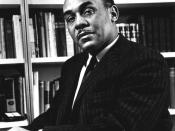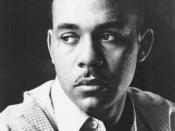"I'd rather be lonely alone than lonely with somebody else." This quote by J. Baylock summarizes the conclusion that the narrator comes to at the end of the story. In Invisible Man, Ralph Ellison uses the unnamed narrator to show the ideals of society. The alienation of the narrator and the attitudes exhibited by other characters toward the protagonist show how he is truly isolated from everyone. In the end, he rejects those who have rejected him.
The protagonist of the story is an African-American who truly isn't accepted in mainstream society. He begins the story as a young boy who has been invited to deliver a speech to a group of prominent white men. His speech has to do with the black race living in humility and submission in order to advance. Before he delivers the speech the men have him engage in a "battle royal"ÃÂ for their own entertainment.
They end up giving him a scholarship to go to the state college for blacks, only after he explains that he made a mistake when he says that there should be "social equality."ÃÂ While at the college, the narrator has the job of driving Mr. Norton, one of the school's white, rich founders, around. One day, he accidentally drives Norton to the old slave quarters, and to the cabin where Trueblood lives. Many people hate Trueblood because he got his own daughter pregnant. Norton listens to Trueblood's story with an odd fascination, and once it is done, gives Trueblood a hundred dollars. Once the president of the college, Dr. Bledsoe, hears of the afternoon's events, he decides to expel the narrator. He says that he should have only shown the white man what the college wanted him to see. Bledsoe then offers to send the narrator to New...


